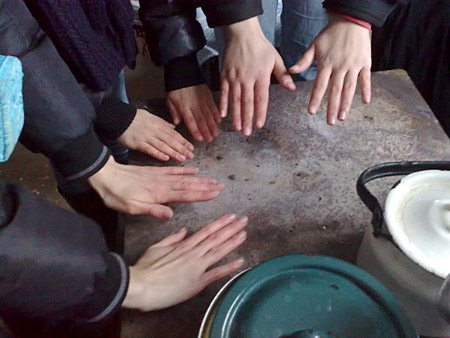This post is part of our special coverage Caucasus Conflict Voices [1].

Tsopi: Azerbaijani and Georgian participants warm their hands after a long, cold day reporting in the regions of Georgia © Onnik Krikorian / Oneworld Multimedia 2009
With three unresolved conflicts and a local media that often self-censors, blogs comment on an online project hoping to break stereotypes [2] by reporting on examples of ethnic groups otherwise in conflict in the South Caucasus co-existing peacefully together. The project was undertaken by Global Voices Online's Caucasus editor alongside bloggers and journalists from Azerbaijan and Georgia.
Since then, and a series of posts [3] for Transitions Online's Steady State, a number of other bloggers have commented on the initiative. In an extended post, Ianyan, a blog-based Armenian online magazine, says that the outcome of the project is reason for hope in a region fractured by ethnic divides and historical differences [4].
In Tsopi, a Georgian village close to the Armenian border, a group of 80 pupils study together at a dilapidated school with no running water or electricity. Although this scenario might not seem uncommon in parts of the world, the students, who are ethnic Azeri and Armenians might surprise you. Armenians know the Azerbaijani language and Azeris know Armenian. After countless years of war and animosity, co-existence seems like a Utopian fantasy for these two groups.
[…]
The fact that there is still some corner in the world where two ethnic groups with loaded histories can interact and live together in peace leaves room for hope, a notion that is evident by the comments left on posts as Transitions Online.
Meanwhile, Azerbaijani regional analyst and blogger Arzu Geybullayeva also comments on its latest phase [5].
This could be a real push in building dialog between the two countries and their people not to mention perhaps a beginning of strong ties. These trips show that coexistence is possible and its only a matter of effort and will to make such collaboration and coexistence happen. Maybe it is time stop using NK conflict as a bargaining chip and stall growing enmity between the two people, replacing it with more initiatives as such.
New media trainer, veteran journalist, and former online editor and consultant for the BBC, CNN and Al Jazeera, David Brewer, says the project is an example of the role [6] that online alternative voices could play in the region [7].
An online project, bringing together new and social media, is aiming to enhance understanding between the ethnic groups across the South Caucasus.
[…]
Some in mainstream media welcome the perspectives offered by such initiatives. Richard Sambrook, the Director BBC Global News, says bloggers play a valuable role.
[…]
“Social media provides increasingly important opportunities for an independent perspective on society or politics. Citizens can determine for themselves how their lives are seen and portrayed – independently of any political or commercial agenda.”
Over the coming days and weeks there will be more such examples using new media and social networking tools and stories, photos, and video as a continuation of the brief cross-border exercise [8] undertaken in September. Follow it on Twitter @caucasusproject [9].
This post is part of our special coverage Caucasus Conflict Voices [1].